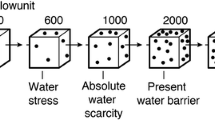Abstract
Dealing with uncertainties in water management is an important issue and is one which will only increase in light of global changes, particularly climate change. So far, uncertainties in water management have mostly been assessed from a scientific point of view, and in quantitative terms. In this paper, we focus on the perspectives from water management practice, adopting a qualitative approach. We consider it important to know how uncertainties are framed in water management practice in order to develop practice relevant strategies for dealing with uncertainties. Framing refers to how people make sense of the world. With the aim of identifying what are important parameters for the framing of uncertainties in water management practice, in this paper we analyze uncertainty situations described by decision-makers in water management. The analysis builds on a series of “Uncertainty Dialogues” carried out within the NeWater project with water managers in the Rhine, Elbe and Guadiana basins in 2006. During these dialogues, representatives of these river basins were asked what uncertainties they encountered in their professional work life and how they confronted them. Analysing these dialogues we identified several important parameters of how uncertainties get framed. Our assumption is that making framing of uncertainty explicit for water managers will allow for better dealing with the respective uncertainty situations.
Similar content being viewed by others
References
Bouwen R, Taillieu T (2004) Multi-party collaboration as social learning for interdependence: developing relational knowing for sustainable natural resource management. J Community Appl Soc Psychol 14:137–153. doi:10.1002/casp.777
Brugnach M, Tagg A, Keil F, de Lange WJ (2007) Uncertainty matters: computer models at the science–policy interface. Water Resour Manag 21(7):1075–1090. doi:10.1007/s11269-006-9099-y
Brugnach M, Dewulf A, Pahl-Wostl C, Taillieu T (2008) Towards a relational concept of uncertainty: about knowing too little, knowing too differently and accepting not to know. Ecol Soc 13(2). http://www.ecologyandsociety.org/vol13/iss2/art30
Denzau AT, North DC (1994) Shared mental models: ideologies and institutions. Kyklos 47(1):3–31. doi:10.1111/j.1467-6435.1994.tb02246.x
Dewulf A, Craps M, Bouwen R, Taillieu T, Pahl-Wostl C (2005) Integrated management of natural resources: dealing with ambiguous issues, multiple actors and diverging frames. Water Sci Technol 52:115–124
Dewulf A, François G, Brugnach M, Isendahl N, Taillieu T, Pahl-Wostl C, Möllenkamp S (2008) The role of uncertainty, ambiguity and framing in transition to adaptive management. About knowing too little, accepting not to know and knowing too differently. Deliverable of the EU 6th FP NeWater project. www.newater.info
Dewulf A, Gray B, Lewicki R, Putnam L, Aarts N, Bouwen R, Van Woerkum C (2009) Disentangling approaches to framing: mapping the terrain. Hum Relat 69(2):155–193. doi:10.1177/0018726708100356
Doyle JK, Ford DN (1998) Mental models concepts for system dynamics research. Syst Dyn Rev 14:3–29. doi:10.1002/(SICI)1099-1727(199821)14:1<3::AID-SDR140>3.0.CO;2-K
Einsiedel E, Thorne B (1999) Public responses to uncertainty. In: Friedmann SM, Dunwoody S, Rogers CL (eds) Communicating uncertainty: media coverage of new and controversial science. Lawrence Erlbaum, Hillsdale
Friedmann SM, Dunwoody S, Rogers CL (eds) (1999) Communicating uncertainty: Media coverage of new and controversial science. Lawrence Erlbaum Associates
Friend J, Hickling A (1997) Planning under pressure—the strategic choice approach. Butterworth-Heinemann, Oxford
Gray B (1989) Collaborating. Finding common ground for multiparty problems. Jossey-Bass, San Francisco
Gray B (2003) Framing of environmental disputes. In: Lewicki R, Gray B, Elliot M (eds) Making sense of intractable environmental conflicts—frames and cases. Island, London
Hare M, Pahl-Wostl C (2002) Stakeholder categorization in participatory integrated assessment processes. Integr Assess 3(1):50–62. doi:10.1076/iaij.3.1.50.7408
Kaufman S, Smith J (1999) Framing and reframing in land use change conflicts. J Archit Plann Res 16(2):164–180
Kickert WJM, Klijn E-H, Koppenjan JFM (1997) Managing complex networks—strategies for the public sector. SAGE, Newbury Park
Klauer B, Brown J (2004) Conceptualizing imperfect knowledge in public decision making: ignorance, uncertainty, error and risk situations. Environ Res Eng Manage 1(27):124–128
Levin IP, Schneider SL, Gaeth GJ (1998) All frames are not created equal. Organ Behav Hum Decis Process 76(2):149–188. doi:10.1006/obhd.1998.2804
McCulloch CS (2007) Integrating research for water management: synergy or dystopia? Water Resour Manag 21(12):2075–2082. doi:10.1007/s11269-007-9161-4
Pahl-Wostl C, Jaeger CC, Rayner S, Schär C, van Asselt M, Imboden DM, Vckovski A (1998) Regional integrated assessment and the problem of indeterminacy. In Cebon P, Dahinden U, Davies HC, Imboden DM, Jaeger CC (eds) Views from the Alps: regional perspectives on climate change. MIT, Cambridge, pp 435–497
Pahl-Wostl C, Craps M, Dewulf A, Mostert E, Tabara D, Taillieu T (2007) Social learning and water resources management. Ecol Soc 12(2):5
Schön DA, Rein M (1994) Frame reflection—toward the resolution of intractable policy controversies. Basic Books, New York
van Asselt M, Rotmans J (2000) Uncertainty in integrated assessment—a bridge over troubled water. ICIS (International Centre for Integrative Studies) Maastricht University:60
Weick K (1995) Sensemaking in organizations. Sage, Thousand Oaks
Walker WE, Harremoes J, Rotmans J, van der Sluijs JP, van Asselt M, Janssen P, Krayer von Kraus MP (2003) Defining uncertainty—a conceptual basis for uncertainty management in model-based decision support. Integr Assess 4(1):5–17. doi:10.1076/iaij.4.1.5.16466
Xu Y-P, Tung Y-K (2008) Decision-making in water management under uncertainty. Water Resour Manage 22(5):535–550. doi:10.1007/s11269-007-9176-x
Author information
Authors and Affiliations
Corresponding author
Rights and permissions
About this article
Cite this article
Isendahl, N., Dewulf, A., Brugnach, M. et al. Assessing Framing of Uncertainties in Water Management Practice. Water Resour Manage 23, 3191–3205 (2009). https://doi.org/10.1007/s11269-009-9429-y
Received:
Accepted:
Published:
Issue Date:
DOI: https://doi.org/10.1007/s11269-009-9429-y




